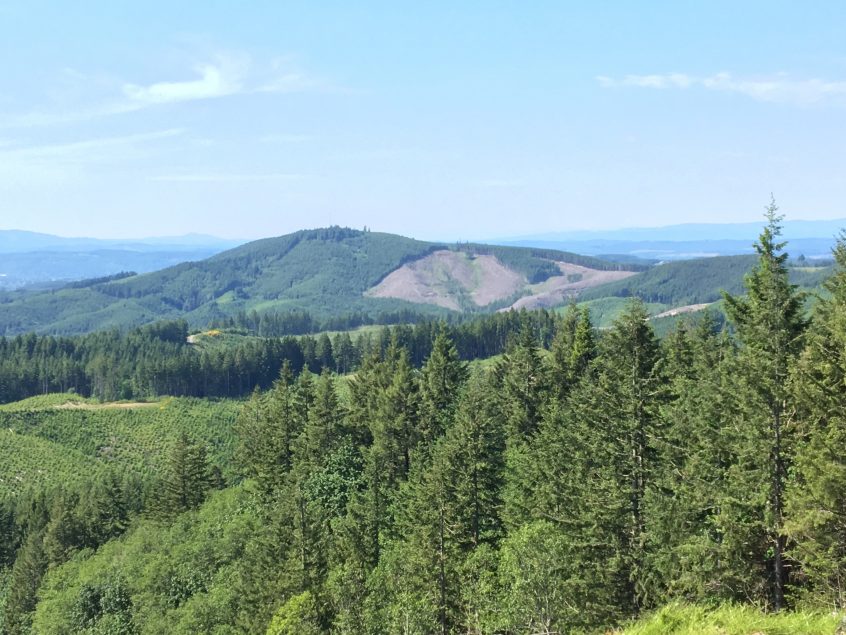Pope Resources, based in Poulsbo, Wash., has partnered on an extraordinary conservation deal that has such wide scope that it’s taken more than a decade to complete. The last stage of the Mount St. Helens Forest Conservation project is being finalized today, nine years after the project was first announced and more than a decade after discussions first began.
The project protects 20,000 acres of Pope-owned forestland in Skamania County from development. In a four-stage deal, the environmental group Columbia Land Trust bought some of Pope’s land outright and purchased conservation easements on the rest. We wrote about the second stage of the deal in 2013 and the third stage in 2014. The fourth and final stage of the deal is closing today.
The Vancouver Columbian, which took an in-depth look at the conservation project this week, wrote that the parties involved, from Pope Resources to the Columbia Land Trust to Skamania County officials, were not trustful of each other at first. Pope, for one, needed to overcome internal skepticism to the deal.
“When we started, a couple of us came into a very traditional timber company. The word ‘conservation’ was married with words like ‘communism,’ ” said (Jon Rose, vice president of Pope’s real estate division.) Pope hadn’t sold conservation easements before, and doing so at such a large scale was a big step — one some of his colleagues with a background in traditional forestry weren’t ready to take. The company owns about 120,000 acres, and manages another 100,000, so taking an unprecedented course on 20,000 acres over a decade was a significant action.
“There was so much damage done in the ’60s and ’70s and people were labeling each other … but our (CEO was) an MBA, not a forester. If I could show him on a spreadsheet why it made sense he was unemotional,” Rose said.
For the company it did make sense. Pope received payment for the value development brought to their property without actually doing any development. On top of that, they got to continue using it as a working forest.
In the decade since Pope started negotiating the deal in Skamania County, there’s been a shift in how timber companies, environmental groups and local, state and federal governments work together. Collaboratives are popular. Timber companies are more willing to sell conservation easements, especially if it means keeping the land as working forests.
Since Pope began working with the (Columbia Land Trust) they’ve embraced a substantial amount of conservation easement sales elsewhere, particularly around Hood Canal. When the final land trust deal is inked, they’ll have done a total of 45,000 acres of conservation easements across their holdings. The company said they’re open to selling the Columbia Land Trust another 680 acres worth of easements around Swift Reservoir.
Rose said those hard feelings that surrounded the negotiations in the first few years between foresters and conservationists have softened, not only in his own company but across the industry.
“Since we’ve started this it’s totally different. Nationally, industrywide, conservation and forestry seem to go like this,” he said knitting his fingers together. “Now the real enemy is real estate. It’s like ‘Keep those damned developers out of the woods.’ ”
The significance of finding an agreement in such an acrimonious setting isn’t lost on (Cherie Kearney, Columbia Land Trust forest conservation director).
“(It’s) meaningful achieving conservation on that scale and holding relationships together with the county, timber company and the state,” Kearney said. “There’s symbolisms there … finding a path that’s balanced, a path that isn’t adversarial or one side against another, but a path that’s collaborative because it’s in a context that has a very adversarial recent past.”
Even some Skamania leaders have become more comfortable with conservation groups.
Skamania County Commissioner Tom Lannen, a Republican who was elected in 2016, said he was told by some conservative constituents to be wary of the land trust and other conservation groups. But he’s been pleasantly surprised by them and especially this pact.
“It’s kind of a unique blend of different players coming together and ending up with a reasonable outcome that suits the needs of a great many people,” he said. “From our standpoint (we get a small tax on cut logs) and we’re not running deputies up there or firetrucks. It’s something I can certainly live with.”
